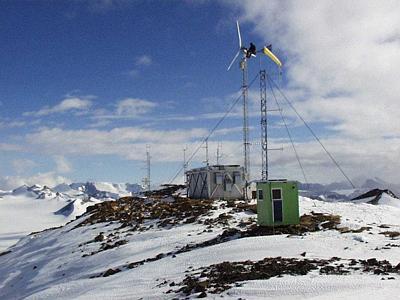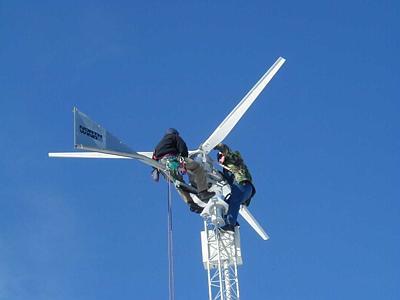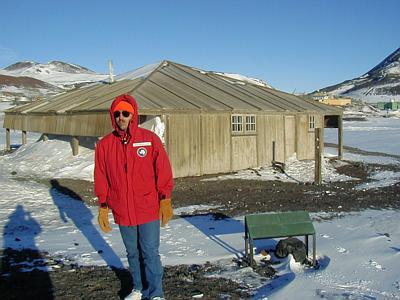6 December, 1999
East Lake Bonney, Taylor Valley, Antarctica
Monday
Another day of sampling out in the wilds of Antarctica! Gale force winds
had been predicted, but they never materialized so we were able to fly out
in the morning. We finished our work early and spent the remaining 2 hours
playing and enjoying the scenery before the helo picked us up at 5 p.m.
It's amazing to watch the helo landing on the ice! The wind that the helo
generates is incredible! We have to hold down some of our things so that
they won't blow away! Scott, our pilot from Saturday, quizzed me all the
way back to McMurdo on points of interest along the way. "What is that
glacier, Sharon?" "The Ferrar Glacier." "Good!", Scott would say. "What is
that island over there?" "Uhh...Inaccessible Island?" "Yes!" I wasn't
always correct and Julie and Mark had to help me out on the questions!
We worked until late in the evening. Tomorrow I have the early gas
chromatograph shift. That is, I have to be ready to begin injecting the
gases at 7:30 a.m. Off to sleep!
ANSWER TO YESTERDAY'S QUESTION: Admiral Richard E. Byrd and his crew were
the first people to fly over the South Pole on November 29, 1929. "For a
few seconds we stood over the spot where Amundsen had stood December 14,
1911 and where Scott had also stood. There was nothing now to mark that
scene; only a white desolation and solitude disturbed by the sound of our
engines."
TODAY'S QUESTION: This year marks the 30th anniversary for something in
Antarctica. Do you know what we are celebrating?
POLAR PROFILE: Robert de los Santos is a Staff Sergeant with the United
States Air Force. I met Rob in Christchurch during our marathon wait for
good flying weather! Rob is in Antarctica as an inspector for the Air Force
Technical Applications Center (AFTAC). AFTAC maintains sensors around the
world that detect seismic activity (movement within the Earth's crust).
When we think of seismic activity, usually we think of earthquakes. Rob's
sensor are actually looking for something else. They monitor compliance
with the Comprehensive Test Ban Treaty. This treaty bans the use or testing
of any nuclear device by nations that signed the treaty. Rob is making sure
that the equipment that is used to measure this seismic activity meets
military standards. While in Antarctica, Rob will work at Bull Pass
(between the Wright and McKelvey Valleys), at Mount Newell, and at Scott
Base (the New Zealand research facility).
Rob is a veteran of Desert Storm and was involved in military activities in
Panama in 1989 that led to the arrest of Manuel Noriega. Next year Rob will
begin Officer Training School. He is active in his community, working for
Habitat For Humanity. Rob is married and has 3 daughters. He lives in Cocoa
Beach, Florida, where AFTAC is located.
Sharon
JUST FOR KIDS!!!!
I got to spend another day at Lake Bonney! We finished our work early and
had time to play and enjoy the scenery!
On the way home, Scott our helicopter pilot played "Jeopardy!" with us! He
would point out glaciers and islands and ask us to name them. I knew most
of them, but on a few he stumped me!
ANSWER TO YESTERDAY'S QUESTION: Admiral Richard E. Byrd was the first to
fly over the South Pole on November 29, 1929. "For a few seconds we stood
over the spot where Amundsen had stood December 14, 1911 and where Scott
had also stood. There was nothing now to mark that scene; only a white
desolation and solitude disturbed by the sound of our engines."
TODAY'S QUESTION: This year marks the 30th anniversary for something in
Antarctica. Do you know what we are celebrating?
POLAR PROFILE: Robert de los Santos is a Staff Sergeant with the United
States Air Force. Rob is in Antarctica to check equipment that can sense
movements within the Earth's crust (seismic activity). Usually when we
think about seismic activity, we think of earthquakes. Rob's equipment also
recognizes nuclear explosions that make the Earth's crust shake. Rob is
repairing the equipment and making sure that it works correctly.
Rob is a veteran of Desert Storm. He lives in Cocoa Beach, Florida with his
wife and daughters.
Sharon

This is the Mount Newall Station where Robert de los Santos works. Mount Newall is at an elevation of 1920 m.

Robert (on the right) atop the wind generator at the Mount Newall site.

Robert in front of Scott's Discovery Hut.
Contact the TEA in the field at
.
If you cannot connect through your browser, copy the
TEA's e-mail address in the "To:" line of
your favorite e-mail package.
|
